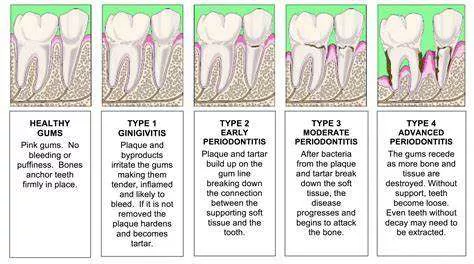Periodontal disease, also known as gum disease, is a common dental condition that affects millions of people worldwide. It is a chronic inflammatory condition that can lead to serious consequences if left untreated, including tooth loss. Many individuals facing periodontal disease wonder if their teeth can be saved and what treatment options are available to preserve their dental health. In this comprehensive article, we will delve into the details of periodontal disease, its effects on oral health, and the strategies dentists employ to save teeth affected by this condition.
Understanding Periodontal Disease
Periodontal disease is a progressive condition that affects the supporting structures of the teeth, including the gums, periodontal ligament, and alveolar bone. It typically begins with the accumulation of plaque, a sticky film of bacteria that forms on the teeth. If not removed through regular brushing and flossing, plaque can harden into tartar or calculus, leading to gum inflammation known as gingivitis.
If left untreated, gingivitis can progress to periodontitis, the more advanced stage of periodontal disease. Periodontitis is characterized by the formation of pockets between the gums and teeth, which can become infected with bacteria. Over time, these pockets deepen, and the supporting bone may be damaged, ultimately leading to tooth mobility and potential tooth loss.
Factors Affecting the Prognosis
The prognosis of teeth affected by periodontal disease depends on several factors, including the severity of the disease, the extent of tissue and bone loss, the patient’s overall health, and their commitment to oral hygiene and professional treatment.
Severity of Periodontal Disease: Mild cases of gingivitis or early-stage periodontitis may be reversible with proper oral hygiene and professional cleanings. However, advanced periodontitis with significant bone loss presents greater challenges in terms of tooth retention.
Extent of Tissue and Bone Loss: The extent of gum recession, pocket depth, and bone loss around the affected teeth influences the prognosis. Teeth with extensive bone support loss may have a poorer prognosis compared to those with minimal damage.
Overall Health: Systemic conditions such as diabetes, cardiovascular disease, and immunocompromised states can impact the body’s ability to heal and respond to periodontal treatment, affecting the prognosis of teeth in periodontal disease.
Patient Compliance: Patients who adhere to recommended oral hygiene practices, attend regular dental check-ups, and follow their dentist’s treatment plan are more likely to achieve positive outcomes in preserving their teeth despite periodontal disease.
Can My Teeth Be Saved if I Have Periodontal Disease?
Treatment Approaches for Saving Teeth
While advanced periodontal disease can pose significant challenges, modern dentistry offers various treatment options aimed at preserving teeth and restoring oral health. These treatments may include:
Scaling and Root Planing: Also known as deep cleaning, this non-surgical procedure involves removing plaque and tartar from below the gumline and smoothing the tooth roots to promote healing and reduce pocket depths.
Antibiotic Therapy: In conjunction with scaling and root planing, dentists may prescribe antibiotics to control bacterial infection and reduce inflammation in the gums.
Surgical Interventions: In cases where non-surgical methods are insufficient, surgical procedures such as flap surgery, bone grafting, or guided tissue regeneration may be necessary to access and treat deeper pockets and restore damaged bone.
Laser Therapy: Advanced laser technologies can target and remove infected tissue while promoting the regeneration of healthy gum and bone tissue, supporting tooth stability.
Ongoing Maintenance: Following active treatment, patients are advised to maintain regular dental visits for professional cleanings, monitoring of periodontal health, and reinforcement of oral hygiene practices at home.
Prognosis And Long-Term Outlook
The prognosis for saving teeth in periodontal disease varies depending on individual factors and the effectiveness of treatment interventions. In cases where periodontal disease has caused significant damage, tooth extraction may be necessary to prevent further complications and preserve overall oral health.
However, with early detection, prompt intervention, and comprehensive periodontal care, many teeth affected by periodontal disease can be saved, allowing patients to maintain functional, healthy smiles. It is crucial for individuals with periodontal disease to work closely with their dentists, adhere to recommended treatments, and prioritize oral hygiene to achieve the best possible outcomes.
Conclution
In conclusion, while periodontal disease can pose challenges to dental health, timely intervention, appropriate treatment modalities, and patient collaboration can significantly improve the chances of saving teeth affected by his condition.
Dentists play a vital role in assessing the extent of periodontal disease, formulating personalized treatment plans, and empowering patients to take control of their oral health for a brighter, tooth-saving future.

